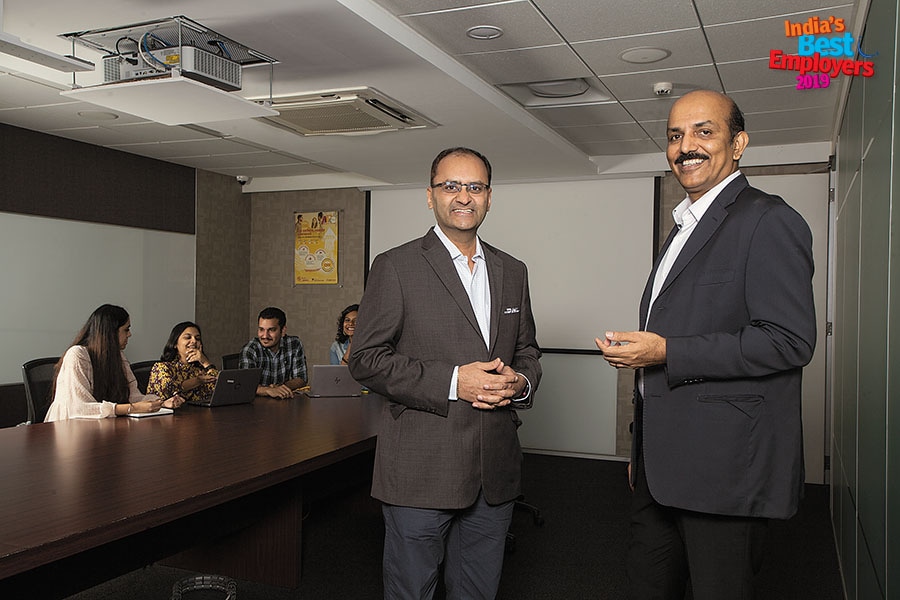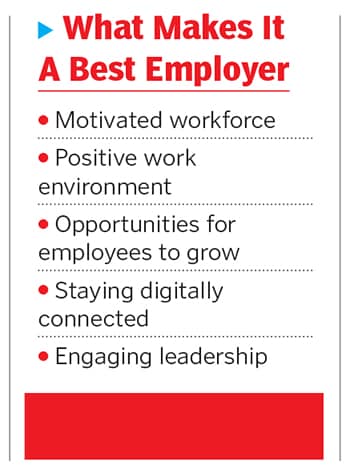
DHL Express India delivers the good
The company helps employees study further, improve their skill sets and remain engaged
 Sunjoy Dhawan (left), vice president, HR, DHL Express India, and RS Subramanian, country manager, believe in fostering a conducive work environment
Sunjoy Dhawan (left), vice president, HR, DHL Express India, and RS Subramanian, country manager, believe in fostering a conducive work environmentImage: Aditi Tailang
When Ajit Kumar Jain started working at DHL Express India in Jaipur in 1998 after finishing school, it was because of his family’s financial condition. He eventually managed to complete his graduation in 2000 through a part-time course. “I wanted to do an MBA, but the fee was too high,” he says. “So I dropped the idea, until a colleague told me about DHL’s Umang programme.”
Through this continuous education programme meant for frontline employees of DHL Express India, Jain completed his part-time MBA from Jaipur National University in 2018, following which he was selected as a lead courier in Bhiwadi, Rajasthan.
DHL Express India set up Umang in 2015, when its human resources (HR) team learnt that several frontline employees had to stop studying in order to earn a living. Sunjoy Dhawan, vice president, HR, says, “Every year we pick about 75 employees who wish to continue their education, and help them enrol in different universities that offer part-time graduation and post-graduation programmes.” At present, the company has about 250 employees who are studying, and 50 who have graduated from their courses.
“The improved education level and better skill sets add value to the company. In-house programmes [such as Umang] for workers give a three-fold advantage: Increased productivity, lower attrition rate, and skilled workforce,” says Gayathri Vasudevan, CEO, LabourNet. Another programme that is popular among frontline employees is ‘English Vinglish’, which teaches conversational English to customer-facing employees.
DHL Express India also aims to care for their employees’ families. In 2014, DHL Express Global started the UPstairs programme through which it reimburses the cost of school fees, books, study material, and extra coaching classes for qualifying children of employees.
“We pick about 10 employees every year, with low salaries but whose children have a bright future and give them €1,000 (approximately ₹75,000) every year, for three years,” says Dhawan, adding that they get about 100 to 200 applications every year. While primary and secondary education might still be affordable, college education is expensive. “We have children who are pursuing their BTech and BDS under this programme. About 50 children have benefited through it in the last five years.”

“Our people are empowered and made to feel like equal owners in the organisation’s larger purpose, and we feel responsible for their overall well-being. All our initiatives are centred around this,” says RS Subramanian, country manager, DHL Express India.
To ensure the well-being of its employees, DHL Express India has a policy to address chronic illnesses. “Employees with chronic illnesses (on leave) are paid their full salary for the first three months; from 90 to 120 days they are paid 75 percent of salary, after which they are paid 50 percent of their salary. It is our way of letting them know that they are being taken care of,” says Dhawan.
The company has also reworked its retirement policy after realising that as soon as employees retire they lose medical insurance coverage. “We have extended our medical support for retiring employees for the next five years. So even after 58 [retirement age] they are covered for another five years. And if they wish to, they can extend it as well,” says Dhawan.
Considering its vast network of 3,200-plus employees, the company has used digital tools to stay connected. “Our internal social networking mobile application ‘As One’ is designed to be an employee engagement tool. It is a platform that aims to give employees easy and on-the-go access to updates and employee-related details, while also serving as a tool to build and enhance connections,” explains Subramanian. The spirit of intrapreneurship is highly encouraged among employees through the ‘Start Up Lab’, an incubator programme that offers funding, coaching, lean processes, and a network of experts for innovative and viable ideas that employees come up with.
Dhawan believes the key to DHL Express India’s low attrition rate is its good work environment. “None of our couriers go out on bikes to make deliveries. Globally also, we have vans with drivers, and a courier goes with them to make deliveries. This makes a big difference to our employees who make deliveries in parts of India that lack good connectivity,” says Dhawan. He adds that unlike other delivery companies, DHL’s couriers’ incentives are not based on the number of deliveries they make but on their customer feedback.
Vasudevan of LabourNet, however, believes there is a lot more that can be done: “Logistic sector leaders such as DHL could implement programmes where they can assess the skill set of employees and certify them as per industry standards. It will help the unskilled and semi-skilled workers gain recognition of the skill, which they have gained over a course of time. This would help the workers in their career progression with better pay and opportunities.”
(This story appears in the 30 November, -0001 issue of Forbes India. To visit our Archives, click here.)








